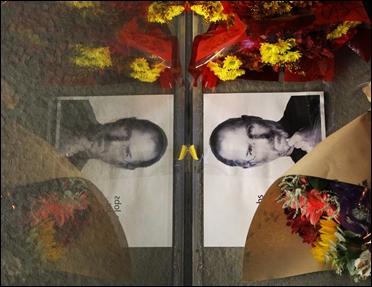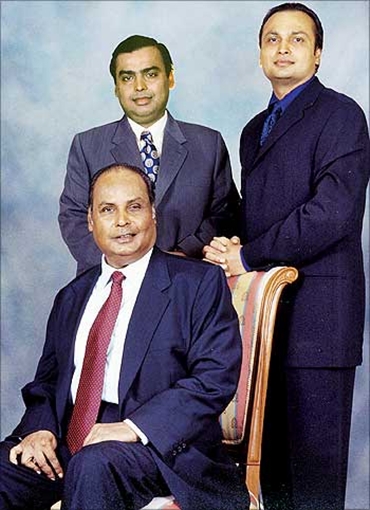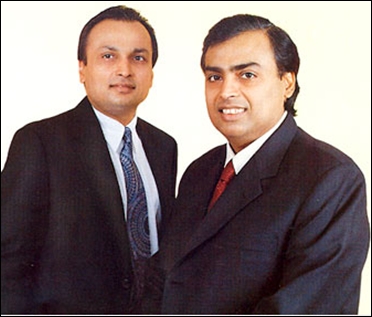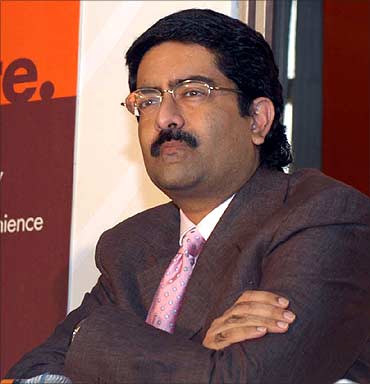Photographs: Jo Yong hak/Reuters. Kanika Datta
Did anyone notice that when Steve Jobs died, discussions about his succession and legacy at Apple excluded any mention of his son?
Sure, Reed Paul, 20, stands to inherit a goodly portion of the wealth his father created, along with his mother and siblings.
But nowhere was the prospect of stepping into his father's shoes at Apple even raised.
Americans might not find this omission particularly surprising.
Corporate culture: Why US beats India!
Image: Berkshire Hathaway chairman Warren Buffett plays table tennis using a giant paddle.Photographs: Rick Wilking/Reuters.
Apple, after all, is a listed conglomerate, one of America's most valuable companies so it is only logical that shareholder value should trump promoter interests.
Nor is Jobs an outlier. Neither Warren Buffett, nor Bill Gates or Larry Ellison can be spotted grooming their children for succession - indeed, the question doesn't even arise and Buffett and Gates have given away most of their wealth in the lifetime anyway.
...
Corporate culture: Why US beats India!
Image: Hewlett-Packard Belgian headquarters.Photographs: Reuters.
At HP, the founders' families remain custodians of their legacy and values - but note the constant search for a professional to run the conglomerate.
No one's considering a Hewlett or a Packard for the job, although there are plenty of them around.
...
Corporate culture: Why US beats India!
Image: Bill Ford.Ford is an exception in that a family member, Bill Ford, took charge as president and CEO, though he handed over the reins to Alan Mulally within months, retaining only the executive chairman's post.
Still, it was enough of an exception to invite much comment when it happened.
Across the pond, Martin Sorrell, who made WPP the global conglomerate it is today, has publicly said he has no intention of passing on his managerial mantle to his children.
...
Corporate culture: Why US beats India!
Image: Dhirubhai Ambani, Mukesh and Anil Ambani.But yes, he bluntly assured me at a meeting earlier this year, if he were "to be hit by a bus tomorrow," there is a professional succession plan in place.
But this logic doesn't seem to hold true in India.
For instance, when Dhirubhai Ambani died in 2002, there were no doubts that his sons would inherit his managerial mantle.
...
Corporate culture: Why US beats India!
Image: Anil and Mukesh Ambani (R).The brothers had been transparently groomed for inheritance for years before that so the only speculation at their father's death was when they would fall out and who would get what when they did.
Yet Reliance Industries, the group flagship, was listed on the stock exchanges and had risen to become one of India's most valuable companies during his lifetime.
...
Corporate culture: Why US beats India!
Image: Kumar Mangalam Birla.Seven years before Aditya Birla died, his son Kumar Mangalam Birla was already in place as his heir.
Like Jobs, the older Birla died young - at age 52 - after an unsuccessful battle with cancer.
But where Jobs handed over the reins to COO Tim Cook before his death, in the A V Birla empire, it was the son who rose.
Indeed, for several years before his death, business journalists were being encouraged to meet the London Business School-educated son.
...
Corporate culture: Why US beats India!
Image: K K Birla.Fully, a decade before that, the business press wrote in wondrous tones about how another Birla, Aditya's uncle K K, had divided his empire among his three daughters.
All the admiring comment at the time was about how K K Birla had chosen to break with tradition of his community and allow his daughters to inherit.
...
Corporate culture: Why US beats India!
Image: An employee of an money exchange counts US dollar bills in Tokyo.Photographs: Yuriko Nakao/Reuters.
Inherit, in this case, did not simply mean enjoying the fruits of any shareholder wealth he might have created; it was a given that the daughters would play significant management roles in the businesses they were bequeathed.
No one thought fit to ask Birla at the time why he hadn't designated and groomed the many senior professional managers who worked in his companies as his managerial inheritors.
...
Corporate culture: Why US beats India!
Image: Godrej group chairman Adi Godrej. Inset: Tanya Dubash.The practice of corporate inheritance is so ingrained in Indian corporate culture - no less than the political, in fact - that no one really thinks about it.
Even today, in the 20th year since the licence raj was dismantled, the business press regularly carry features about "Generation Next", referring to the next generation of inheritors.
...
Corporate culture: Why US beats India!
Image: Bharti Airtel office.Every so often, we receive announcements and photos of fresh-faced young sons - and, increasingly, daughters - joining the boards of their fathers' companies, the obvious inference being that they're being readied for the Big One.
Another index: 16 of the 30 companies listed on the Bombay Stock Exchange's Sensex are family-owned and managed. Several relatively new entrants - Jindal, Sterlite, Sun, Bharti, DLF - are also of this ilk.
...
Corporate culture: Why US beats India!
Image: Ratan Tata.Photographs: Reuters.
Should this matter? Well, not if you look at the manner in which inheritors like Kumar Birla, Anand Mahindra, Ratan Tata and Mukesh Ambani have grown and expanded their businesses.
But the whole process is far too hit-and-miss to be sustainable.
For one, in an increasingly competitive globalised environment, companies need all the talent they can get.
...
Corporate culture: Why US beats India!
Image: India Inc restricting top jobs to family.Restricting top jobs to family only is scarcely the best way to nurture it and the toadying culture it inevitably generates is hardly healthy.
As for shareholder value, consider the heavyweights of the late eighties: Thapar, Modi, C K Birla, Goenka, to name a few.
...
Corporate culture: Why US beats India!
Image: Bombay Stock Exchange.Photographs: Reuters.
Many of their group companies were Sensex stars in their day.
Today, most of those groups have been eclipsed. In contrast, the professionally managed giants of yesteryear, ITC and Hindustan Lever, are still going strong - and they still figure in the Sensex, too.
















article